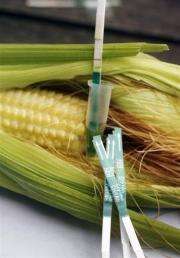EU divided over GM crops

A controversial EU bid to allow member states to make their own decisions on whether or not to ban GM crops hit a fresh snag on Monday when Italy and France dug in their heels against the move.
With the continent deeply divided on genetically modified crops, the European Commission has been thrashing out ways of breaking the deadlock for months and spells out its latest ideas later Monday.
In a rare relinquishing of power, EU officials will propose to shift the onus on member states -- giving nations the freedom to ban or grow GM crops but allowing free circulation of GM goods in line with WTO rules.
But as farm ministers gathered in Brussels there was little sign of quick assent.
"Italy does not support the proposal ... Each for himself undermines the foundations of the common agricultural policy (CAP)", said Italy's farm minister Giancarlo Galan.
"France wants a common decision," agreed French minister Bruno Lemaire. "Opting for national decision-making would give a wrong signal to European citizens and a wrong signal for the common agricultural policy."
Britain and Spain too are opposed to Europe washing its hands by shifting responsibility for a political hot potato to individual nations.
Meanwhile Austria, Hungary and Luxembourg are angry over the commission's green light in March to a GM potato developed by German group BASF, the Amflora, grown in the Czech Republic, Germany, Sweden but only for industrial uses for its starch content.
GM cultivation remains relatively limited in the 27-nation bloc, with six member states banning Monsanto's Mon 810 maize -- Austria, France, Germany, Greece, Hungary, Luxembourg -- and Poland banning all GM crops.
To give opponents a legal basis against GMs, EU health commissioner John Dalli suggests that over and above EU-wide scientific restrictions, nations be able to ban them across all or part of their territory for socioeconomic, ethical or moral reasons.
Dalli said recently that the commission was neither for nor against GMs.
"But in today's world, they are a reality," he said. "Europe cannot stand idle and deny itself the political responsibility to take decisions and implement a policy of responsible innovation."
Europe has fallen behind the rest of the world amid public concerns over the potential effects of GM crops demonised as "frankenfoods" by opponents.
While GM crops were cultivated worldwide in 2009 on 134 million hectares, the maize seed developed by US biotech giant Monsanto, MON 810, was grown on fewer than 95,000 hectares of land in the EU last year, down from almost 107,000 hectares in 2008.
Opponents of GM food fear they would inevitably contaminate other crops and maintain that there is no definitive evidence of their safety.
Supporters argue that such crops have higher yields, resist pests and disease better and require less fertiliser and pesticide. They say farmers should be given the freedom to choose whether they want to plant GM crops.
(c) 2010 AFP















